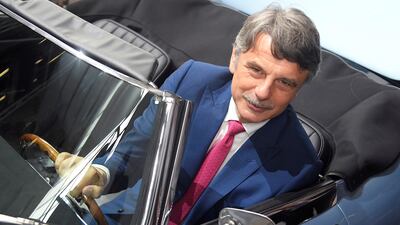The gruff roar of a Jaguar or a Land Rover has been a familiar sound for decades, but it is soon to be replaced by a Prius-like whimper.
Britain’s biggest carmaker announced on Thursday that from 2020, all of its new vehicles will be available in an electric or hybrid version.
The company, which is owned by India’s Tata Motors, had previously said that it was targeting half of its new cars to be available in greener versions by the end of the decade, but it has now accelerated its plans.
_______________
Read more:
Rivals vie for alternative solutions to conventional diesel
Rise of electric vehicles irresistible – but Big Oil will not just disappear
_______________
It comes two months after another large carmaker, Volvo, also pledged to fit all of its new models with an electric motor. Volvo has set itself a target of 2019, one year earlier than JLR’s.
However, both JLR and Volvo will still be making their earlier models that have combustion engines.
Dr Ralf Speth, JLR’s chief executive, said: “Every new Jaguar Land Rover model line will be electrified from 2020, giving our customers even more choice.”
The auto industry is still reeling from the Volkswagen emission testing scandal, which pushed carmakers to step up efforts to “go green”.
They also face increased pressure from governments intent on reducing climate change. In July, Britain announced it would ban the sale of new diesel and petrol cars from 2040, as it seeks to cut pollution. The move followed similar plans in France and in cities including Madrid and Athens.
Demand is soaring for low-emission models, and carmakers have been racing to tap into that.
In November last year, JLR unveiled its first electric concept car, which it said was “the first step towards our future”. At that time, it also promised to give its customers “smarter, cleaner and more efficient” technology.
In today’s announcement, the company said the first of its new electric models – the Jaguar I-Pace, would go on sale in 2018.
Dr Speth added: “We will introduce a portfolio of electrified products across our model range, embracing fully electric, plug-in hybrid and mild hybrid vehicles.”
Industry specialist Professor David Bailey, of the Aston Business School at Aston University, told The National that it was about time JLR made such a move.
“Jaguar Land Rover have been far too slow to the game. They’ve concentrated very much on making their cars lighter, and developing their internal combustion engine,” he said.
“In my view, they failed to appreciate how much electric cars were changing the industry. You’ve had rivals like BMW move much quicker, and you’ve had Tesla come in and steal their lunch.
“However, today’s announcement shows they are now embracing the potential of electric cars, albeit belatedly, and I welcome that.”
At this week’s Tech Fest in London, JLR is also showcasing a range of new car gadgets including an “intelligent steering wheel” called Sayer, which will talk to drivers and answer questions. It will also provide Internet of Things services such as selecting home entertainment options and order food deliveries. “This is a steering wheel like never before,” the company promised.

